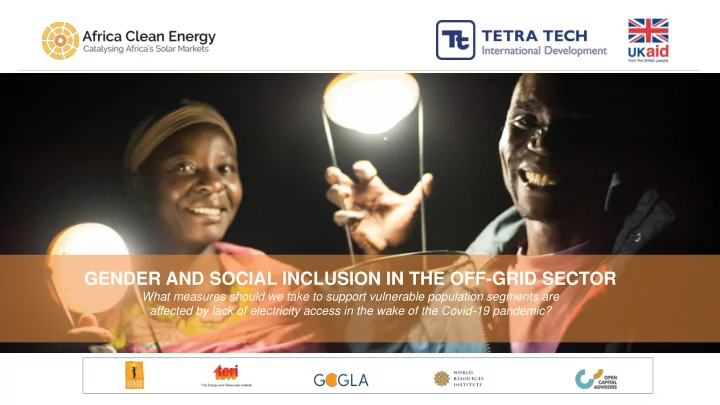

GENDER AND SOCIAL INCLUSION IN THE OFF-GRID SECTOR What measures should we take to support vulnerable population segments are affected by lack of electricity access in the wake of the Covid-19 pandemic?
Speakers Speaker: Speaker: Speaker: Olasimbo Sojinrin Dr. Frederick John, Ndeye Seynabou Pouye, Energy Consultant and Country Director President of GESI specialist for Moderator: Solar Sister FAADEV, ECOWAS, Margaret Wanjiku, Nigeria Senegal Sierra Leone Gender and Social Inclusion Advisor ACE TAF
Activ African Women For Development- FAADEV in Figures • Date of creation: 2018 • Number of members: 35 • Number of projects realized: 2 • Number of female entrepreneurs trained : 164 • Number of SMEs formalized: 33
Context • Need to formalize female entrepreneurs in rural areas into SMEs • Need to create market opportunities and channel of distribution for agrifood business through: Weekly markets( called ‘’loumas’’), national and international exhibition/fairs, supermakets, etc.… • High demand of agrifood products from increasing urbanisation • Low rate of rural electrification : 38% • Challenges for Activities Generating Revenues to access to energy to transform products
FAADEV Experience on GESI • Women Capacity building approach, in partnership with a local solar system manufacturer, « Nadji.Bi Group » • Solar Solutions design for the different activities run by the FAADEV- member female SMEs • Business plans development for female SMEs in rural context • Facilitating Partnership between financial institutions(MFIs & banks) and FAADEV to access to finance with favourable interest rate • Facilitating access to market and business opportunities
Our Solutions I. Multifonctional Platforms to : • transform local cereals (maize, millet, sorgho, etc…); • produce oil from (Baobab, Moringa, Bissap, Coco, Ricin, jujube, etc…); • Manufacture soap and distribution of potable water; • Animations through socio-cultural and education activities ( movies and documentary films, sensitisation, events, etc). II. Mobile payments
Impacts • Labelised agrifood Products • Traceable and simplified method of payments thanks to mobile payment • Distribution of quality agrifood products in urban areas by well trained female entrepreneurs in rural context • Financially independent female entrepreneurs in rural context
Challenges to overcome ▪ Weak rate of formalisation of female SMEs ▪ High rate of illeteracy of women in rural areas ▪ High costs of market penetration in urban areas ▪ Low rate of access to finance for female entrepreneurs in rural areas ▪ Lack of innovative funding vehicles VS. classic banking system with high interest rates (15-20%)
Impact of COVID-19 o Loumas (weekly markets) are shut down and there are lot of restrictions in movements o Exhibitions/fairs are cancelled; o Economic activities are not considered in emergency measures o Difficulties to repay loans for female entrepreneurs in rural areas
Thank You Any Questions?
Recommend
More recommend